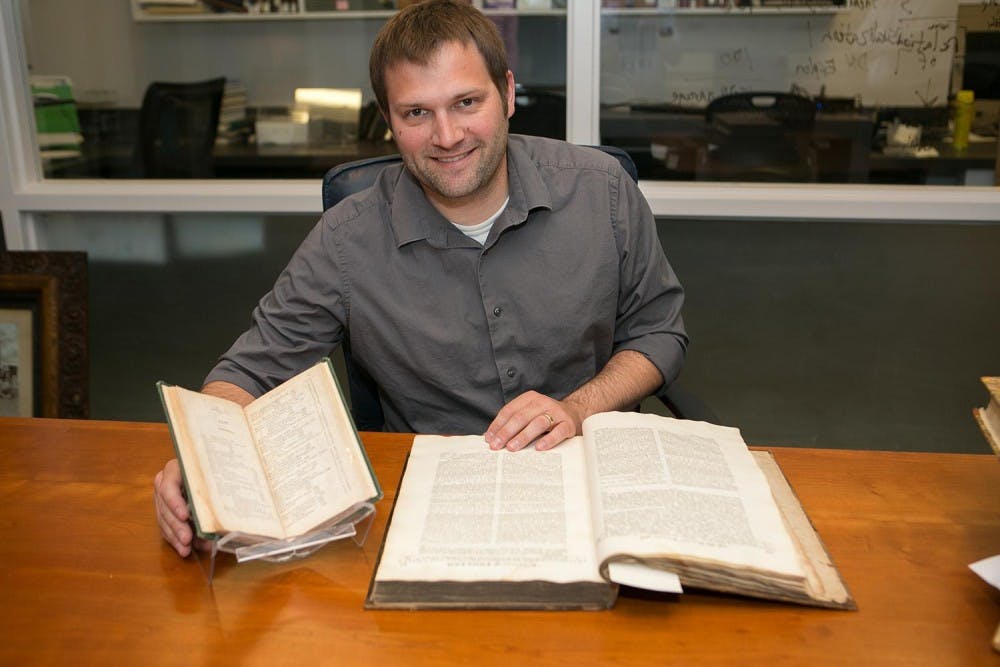The University’s School of Law’s library is digitizing the 336 legal texts catalogued by the University librarian in 1828. The project, which began digitization in May, will create a virtual library where users can scroll through the “shelves,” view high-resolution images of the book spines and reach bibliographical essays about each text.
The books are part of a group of roughly 8,000 legal texts deemed critical for education in law by Thomas Jefferson. The titles comprised the original Rotunda library, but following the 1895 Rotunda fire and throughout the University’s nearly 200-year history, many of them were scattered or lost. The Arthur J. Morris Law Library began a project 40 years ago to recollect exact duplicate editions of Jefferson’s original list.
“We’re not certain if any of the ones we have are originals,” Law Digital Collections Librarian Loren Moulds, said. “Librarians over the last 40 years … Have been trying to collect physical, basically duplicate editions of those so we could have a representative library in our collections.”
In today’s age of technology, Moulds said the library has to consider new opportunities for growth opened up by the digital age.
“We’re trying to figure out … What is an expanded role in a digital age that a library can play in terms of access to information?” Moulds said. “What new things can we glean from these books, with the tools that we have at hand?”
In answering some of these questions, the Law library has taken up the task of digitizing Jefferson’s original 336 recommended legal texts.
According to Randi Flaherty, Special Collection Librarian at the Law Library, postdoctorals created a spreadsheet of all the bibliographic data of the law books about five years ago. Flaherty and Moulds then came up with the idea to create an interactive digital archive of the texts.
“We wanted to create sort of a virtual library … Accessible to everyone,” Flaherty said.
The publication dates of the books range from the mid-16th century through 1826, the year Jefferson died. Moulds emphasized how the virtual library seeks to create a fully immersive, digital experience for handling such old, rare materials.
“This is an opportunity for someone to be able to play around with what a library might look like,” Moulds said. “To figure out where they may have came from, to see what they would look like next to each other, as opposed to say, like Google books, where you get a black and white page.”
While there are 336 titles in the collection, each title may feature multiple volumes or individual books — amounting in total to over 700 books. Jim Ambuske, postdoctoral fellow in Digital Humanities at the Law Library, said the project is moving at a steady pace, digitizing about three to four texts on an average day.
“In the next few weeks we will probably roll out the beta version of the website,” Ambuske said.
The team hopes to have the final website and digitization completed before their April 2018 deadline.
In addition to a search tool for going through the virtual books, the website will also include essays describing the background of the texts.
“We’ll have a number of contextual essays to describe the history of the library, early American legal history, what lawyers like Jefferson were doing and thinking about the law in that period,” Ambuske said. “It helps anybody who wants to look at the site understand the library and how it fits into this broader history, story that we’re trying to tell.”
The project has been able to carry out its goals due to a grant from the Jefferson Trust, which has also provided funding for a student internship component of the program.
“It enabled us to create a student position, fold students in the project directly,” Ambuske said. “They give us the opportunity to do that.”
The librarians said the ultimate goals of the project include increasing access to texts and adapting and growing in the digital age.
Flaherty said the project brought together a number of different scholars and highlighted the role of libraries.
“I would say to showcase libraries as a place of collaborative scholarship I think is one of our main goals,” Flaherty said. “We work in a library but we work with people of all different creeds and this project has really brought together a lot of different fields. But I also think to provide a resource on early American legal education.”
Digitization and online archives are becoming more widespread in today’s day and age. However, the University’s immersive take is particularly original, Mould said.
“We’re definitely part of this ecosystem of growing digital humanities projects but I think ours is one that is pretty innovative in terms of our outreach and the content,” Mould said. “And it’s a timely connection to what’s going on at U.Va. with the Bicentennial … This is a deep connection to Jefferson with all the complications that he brings.”







